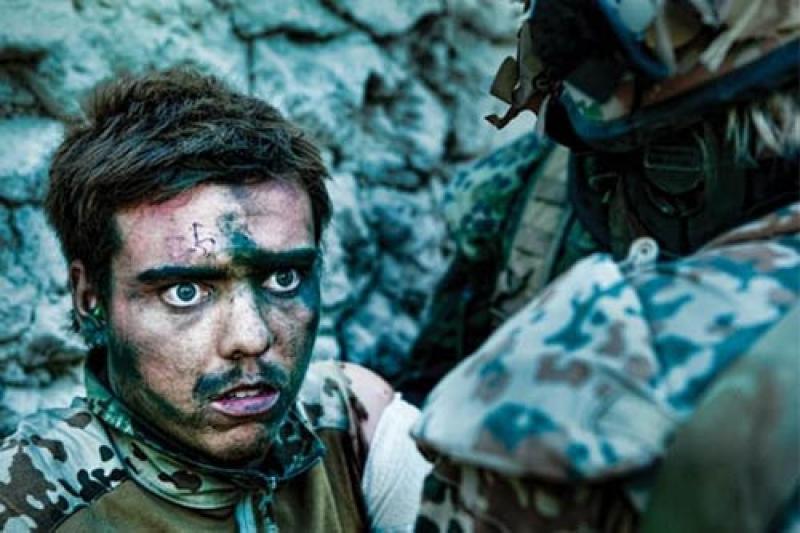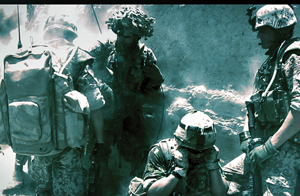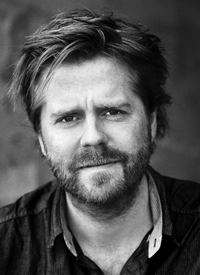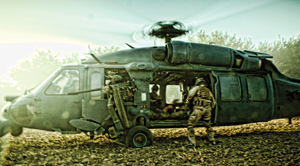Armadillo | reviews, news & interviews
Armadillo
Armadillo
Smell the cordite and feel the fear in Janus Metz's Afghan war documentary

If war is such hell, why do we keep doing it? This may be one of the questions you'll be asking yourself after sitting through the taut and gruelling 100 minutes of Armadillo, Janus Metz's remarkable account of a six-month tour of duty in Afghanistan with soldiers of Denmark's Guard Hussars.
Metz and his cinematographer, Lars Skree, wrote their wills before setting off to Helmand Province in 2009, where they joined the Danish troops at Forward Operating Base Armadillo. It's tempting to make a lazy assumption that the Danish soldiers are something of a political fig leaf helping to make the interminable Afghan campaign look properly international, but from the moment they arrive at Armadillo it's clear that this is no sinecure. Greeting the new men, Platoon Commander Rasmus explains excitedly that they'd had a prolonged exchange of artillery fire with Taliban forces the previous day, and promises that "you can count on some action".
Metz has nudged and massaged his footage to give his film a discreet narrative shape, without betraying an authorial hand at work. The opening scenes zoom in on one of the soldiers, Mads, as he prepares to ship out, and pays a tense visit home to his obviously distraught parents. The filming is so intimate and revealing it seems too good to be true, yet it doesn't feel remotely fake.
 Once the soldiers are in-country, Armadillo seems to follow its own natural progression. The mood steadily darkens as the troops learn more about the country and conditions, and the Taliban threat becomes palpably lethal. The look on the soldiers' faces when they hear that three Danes from another camp have been killed makes dialogue unnecessary. Uno Helmersson's hauntingly minimal soundtrack conveys a sense of strangers in an unknowable land.
Once the soldiers are in-country, Armadillo seems to follow its own natural progression. The mood steadily darkens as the troops learn more about the country and conditions, and the Taliban threat becomes palpably lethal. The look on the soldiers' faces when they hear that three Danes from another camp have been killed makes dialogue unnecessary. Uno Helmersson's hauntingly minimal soundtrack conveys a sense of strangers in an unknowable land.
The Danes' attempts to enlist the support of the locals are rebuffed with stone-cold logic. "We cannot co-operate with you," explains a teacher at an outdoor madrassa. "You come with all your weapons and then you leave. We're staying here, and then the Taliban will come after us. If I talk they'll cut my throat." Local farmers who have had their crops destroyed and their animals and family members killed are unimpressed when the Danes say they're terribly sorry and hand them a wad of cash in compensation (director Janus Metz, pictured below).
 At first the patrols through the flat Helmand countryside seem mundane, but the knowledge that any clump of trees or cluster of buildings may hide machine guns and rocket launchers steadily ratchets up the tension. A distant explosion and plume of smoke announces the detonation of one of the dreaded Improvised Explosive Devices, and radio chatter reveals that it's serious - "Is everyone okay?" "Negative, negative... condition critical..."
At first the patrols through the flat Helmand countryside seem mundane, but the knowledge that any clump of trees or cluster of buildings may hide machine guns and rocket launchers steadily ratchets up the tension. A distant explosion and plume of smoke announces the detonation of one of the dreaded Improvised Explosive Devices, and radio chatter reveals that it's serious - "Is everyone okay?" "Negative, negative... condition critical..."
The immediacy of the action footage is electrifying, not least the scene of a shocked, wide-eyed soldier who's just been shot, one of Armadillo's signature images. The camera is right in among the soldiers as they advance across open ground towards the Taliban who are shooting at them, and when they dive for cover the camera does too. In the firefight that forms the film's climax, you see bullets striking the earth a few feet in front of the cameraman, before he throws himself behind a mud bank.
 It's the events which unfold in this sequence which have transformed Armadillo from being a formidable documentary which has won a clutch of international awards into political dynamite. Under fire at close quarters, the Danes respond with gun and grenade, and the camera obliquely catches the moments when the troops finish off a group of wounded Taliban in a ditch. The action is some distance away and masked by foliage, but you get the idea when there's a cry of "Die, you bastard!" followed by a hail of gunfire.
It's the events which unfold in this sequence which have transformed Armadillo from being a formidable documentary which has won a clutch of international awards into political dynamite. Under fire at close quarters, the Danes respond with gun and grenade, and the camera obliquely catches the moments when the troops finish off a group of wounded Taliban in a ditch. The action is some distance away and masked by foliage, but you get the idea when there's a cry of "Die, you bastard!" followed by a hail of gunfire.
 Afterwards, we see the soldiers in a surge of post-combat euphoria, especially the swaggering, blond-haired Daniel: "That was fucking great. Four of them with a grenade! This is something we'll never forget." Metz also records the scene when the CO tells his troops that the military police are investigating claims that they shot a group of prisoners and took triumphant photographs of themselves with their piled-up victims.
Afterwards, we see the soldiers in a surge of post-combat euphoria, especially the swaggering, blond-haired Daniel: "That was fucking great. Four of them with a grenade! This is something we'll never forget." Metz also records the scene when the CO tells his troops that the military police are investigating claims that they shot a group of prisoners and took triumphant photographs of themselves with their piled-up victims.
We see no evidence that this took place, and afterwards the platoon were congratulated and decorated for their courage under fire, but the suspicion that such savagery could have occurred provoked a furore among Danish politicians and soul-searching from the Danish public. It says something about the confused "health and safety" attitude to war now prevalent in the "civilised" West, as if it's possible to send young soldiers into the irrational maelstrom of combat and expect them to behave like lawyers or social workers. Several of the soldiers, meanwhile, have voted with their feet, and are now back in Afghanistan for another tour of duty.
Watch the trailer for Armadillo
Explore topics
Share this article
The future of Arts Journalism
You can stop theartsdesk.com closing!
We urgently need financing to survive. Our fundraising drive has thus far raised £49,000 but we need to reach £100,000 or we will be forced to close. Please contribute here: https://gofund.me/c3f6033d
And if you can forward this information to anyone who might assist, we’d be grateful.

Subscribe to theartsdesk.com
Thank you for continuing to read our work on theartsdesk.com. For unlimited access to every article in its entirety, including our archive of more than 15,000 pieces, we're asking for £5 per month or £40 per year. We feel it's a very good deal, and hope you do too.
To take a subscription now simply click here.
And if you're looking for that extra gift for a friend or family member, why not treat them to a theartsdesk.com gift subscription?
more Film
 The Mastermind review - another slim but nourishing slice of Americana from Kelly Reichardt
Josh O'Connor is perfect casting as a cocky middle-class American adrift in the 1970s
The Mastermind review - another slim but nourishing slice of Americana from Kelly Reichardt
Josh O'Connor is perfect casting as a cocky middle-class American adrift in the 1970s
 Springsteen: Deliver Me From Nowhere review - the story of the Boss who isn't boss of his own head
A brooding trip on the Bruce Springsteen highway of hard knocks
Springsteen: Deliver Me From Nowhere review - the story of the Boss who isn't boss of his own head
A brooding trip on the Bruce Springsteen highway of hard knocks
 The Perfect Neighbor, Netflix review - Florida found-footage documentary is a harrowing watch
Sundance winner chronicles a death that should have been prevented
The Perfect Neighbor, Netflix review - Florida found-footage documentary is a harrowing watch
Sundance winner chronicles a death that should have been prevented
 Blu-ray: Le Quai des Brumes
Love twinkles in the gloom of Marcel Carné’s fogbound French poetic realist classic
Blu-ray: Le Quai des Brumes
Love twinkles in the gloom of Marcel Carné’s fogbound French poetic realist classic
 Frankenstein review - the Prometheus of the charnel house
Guillermo del Toro is fitfully inspired, but often lost in long-held ambitions
Frankenstein review - the Prometheus of the charnel house
Guillermo del Toro is fitfully inspired, but often lost in long-held ambitions
 London Film Festival 2025 - a Korean masterclass in black comedy and a Camus classic effectively realised
New films from Park Chan-wook, Gianfranco Rosi, François Ozon, Ildikó Enyedi and more
London Film Festival 2025 - a Korean masterclass in black comedy and a Camus classic effectively realised
New films from Park Chan-wook, Gianfranco Rosi, François Ozon, Ildikó Enyedi and more
 After the Hunt review - muddled #MeToo provocation
Julia Roberts excels despite misfiring drama
After the Hunt review - muddled #MeToo provocation
Julia Roberts excels despite misfiring drama
 London Film Festival 2025 - Bradley Cooper channels John Bishop, the Boss goes to Nebraska, and a French pandemic
... not to mention Kristen Stewart's directing debut and a punchy prison drama
London Film Festival 2025 - Bradley Cooper channels John Bishop, the Boss goes to Nebraska, and a French pandemic
... not to mention Kristen Stewart's directing debut and a punchy prison drama
 Ballad of a Small Player review - Colin Farrell's all in as a gambler down on his luck
Conclave director Edward Berger swaps the Vatican for Asia's sin city
Ballad of a Small Player review - Colin Farrell's all in as a gambler down on his luck
Conclave director Edward Berger swaps the Vatican for Asia's sin city
 London Film Festival 2025 - from paranoia in Brazil and Iran, to light relief in New York and Tuscany
'Jay Kelly' disappoints, 'It Was Just an Accident' doesn't
London Film Festival 2025 - from paranoia in Brazil and Iran, to light relief in New York and Tuscany
'Jay Kelly' disappoints, 'It Was Just an Accident' doesn't
 Iron Ladies review - working-class heroines of the Miners' Strike
Documentary salutes the staunch women who fought Thatcher's pit closures
Iron Ladies review - working-class heroines of the Miners' Strike
Documentary salutes the staunch women who fought Thatcher's pit closures
 Blu-ray: The Man in the White Suit
Ealing Studios' prescient black comedy, as sharp as ever
Blu-ray: The Man in the White Suit
Ealing Studios' prescient black comedy, as sharp as ever

Add comment